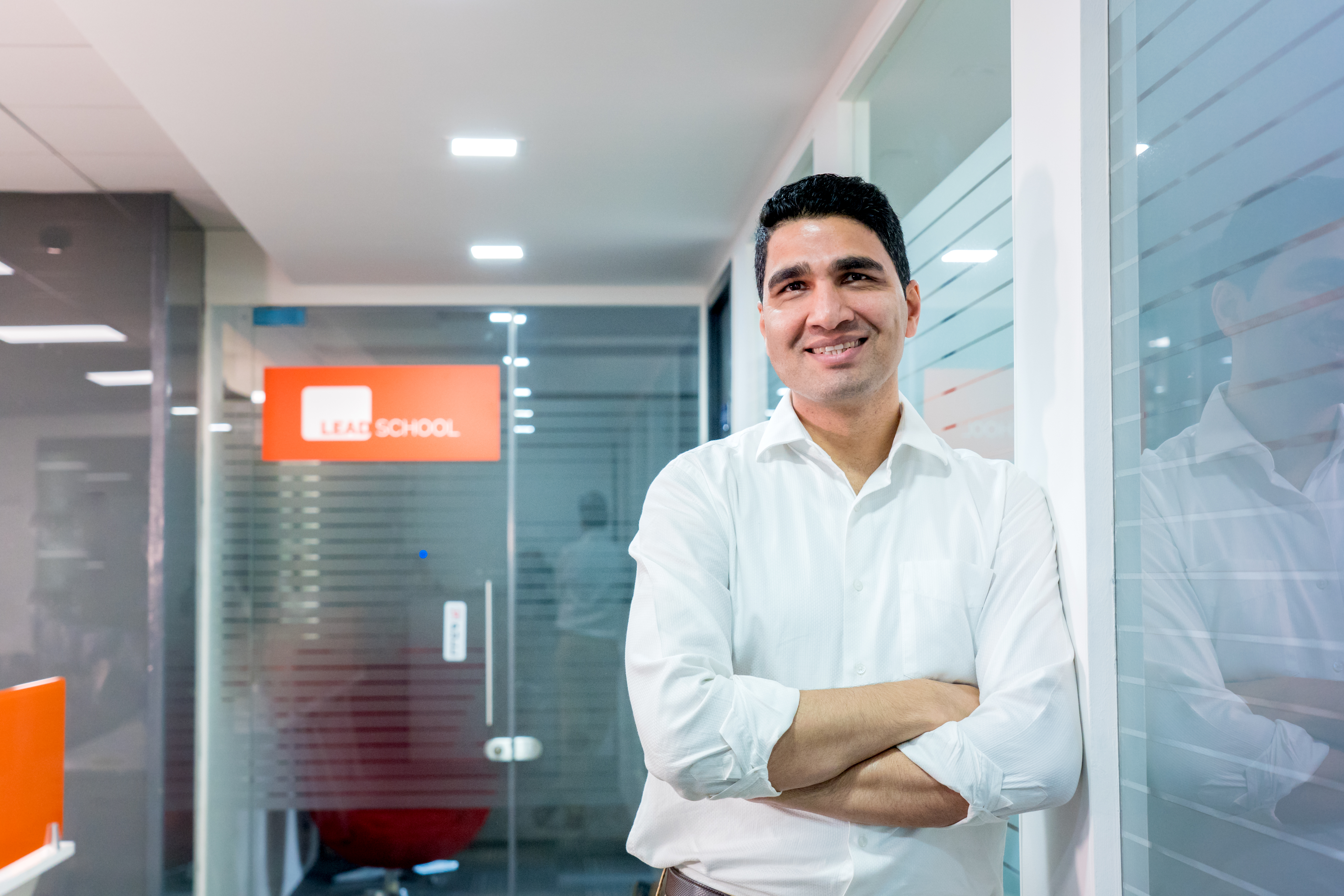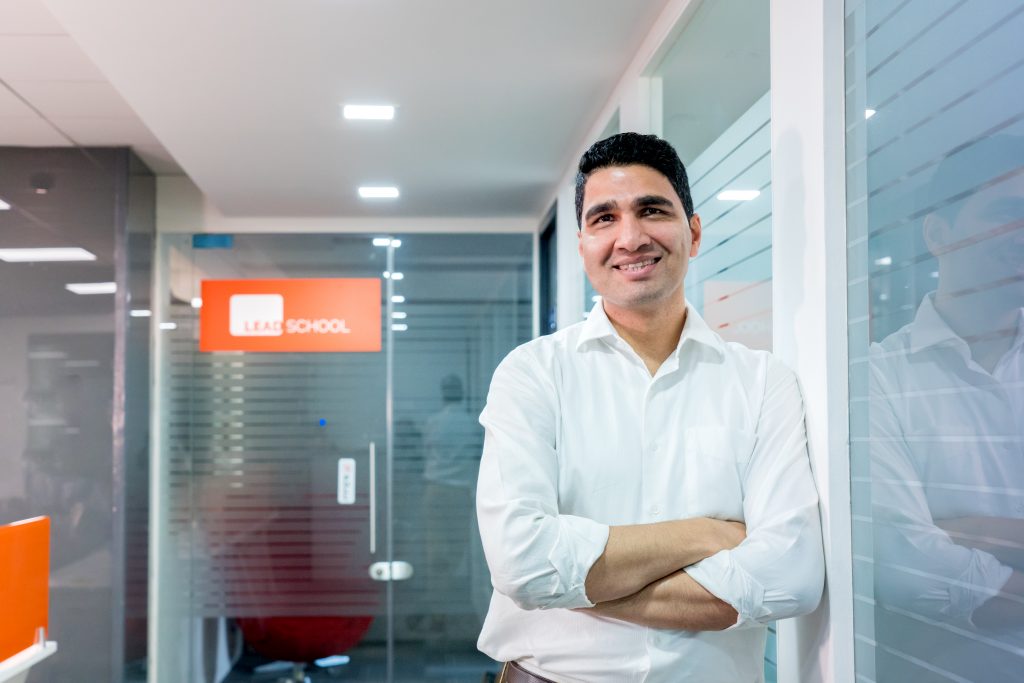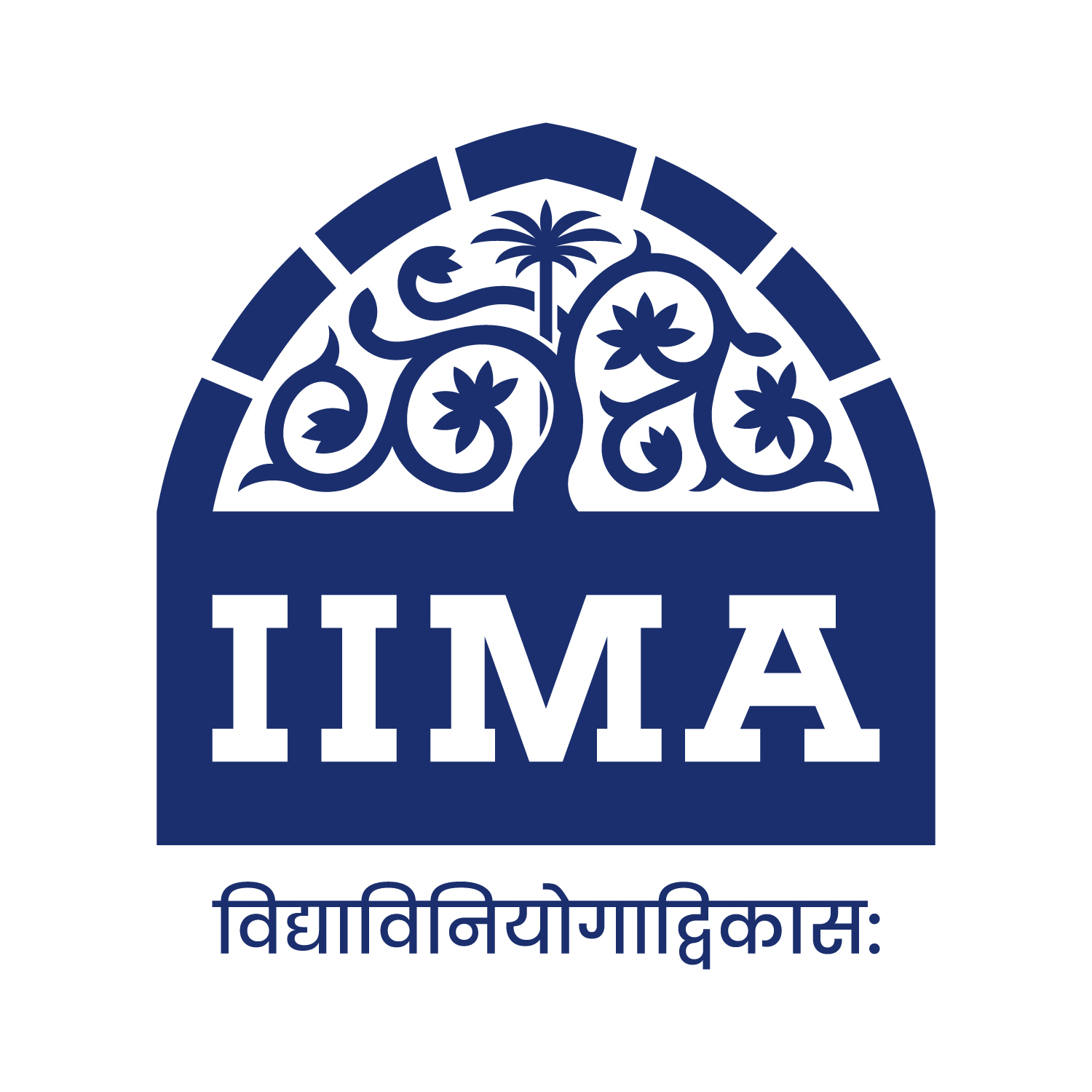ENTREPRENEURSHIP | SUMEET MEHTA (PGP 1999)


Sumeet Mehta (PGP 1999), Co-Founder & CEO, LEAD School
As Co-founder of LEAD School, Sumeet is revolutionizing education in the country by implementing Integrated Learning Systems in affordable schools in Tier 2-4 towns. Over the last 3 years, LEAD has grown into one of India’s fastest-growing, most innovative and largest education companies, serving 7 lakh students, 25,000 teachers and 1800 schools. It is the only company in the country that publishes student achievement and teacher performance data.
Sumeet bootstrapped the organization with his own savings for the first 5 years and then raised Series A and Series B with Elevar Equity, one of India’s foremost impact venture capital firms and from Westbridge Capital, one of India’s foremost Investment firms. Prior to this, he was Chief Executive Officer at Zee Learn (2007-2012). He transformed the institution from a pre-school franchise company with a revenue of Rs. 20 Cr to a Rs. 100 Cr education company with a presence in pre-schools, K-10 schools, School solutions and Vocational Education. He led the company to a listing on the NSE with a market cap of Rs. 800 Cr. He also led the development of iLLUME and Litera Octave, new-to-the-world pedagogies that set the bar of innovation in both preschools and schools. In the past, he led P&G’s businesses in the Asia Pacific for 8 years.
When was the last time you were on campus? I think we came to campus in 2014 for the 15th year reunion of the batch which was a lot of fun. I mean, after campus, I was in P&G and later on moved to Singapore, so didn’t have an occasion to visit the campus.
So, you have not seen the recent construction that’s happening on campus with a JSW School of Public Policy, new academic block, Sports Complex, and much more coming up. We would absolutely welcome you back whenever possible. I would love to. The last time I came, I was just astounded by the shape that the new campus has taken. We didn’t know it was that massive. But I’m sure a lot more has happened in the last six years.
Absolutely! Taking that further, what are your fondest memories from the campus. That is a very deep question. I think most of all it’s friendships. I was in D12 where I met friends for life, along with a lot of friends from Section C in the first year. These are the things that stick with you. I also feel that adversity brings people together. At IIMA, with the academic rigour and the intense environment, you tend to lean on your peers. And then these connections stay with you forever.
Beyond everything else, there are some professors whose personalities have left an indelible mark more than their teaching. Prof Jain, Prof Balki and Prof Ravi C are the three that come to mind, and then Prof. Indira. I think they just taught you the power of simplicity, not only in thinking, but also in living.
So, I would say that these friendships and life learnings, are what I’ve taken from the campus.
What does the YAAA and recognition mean to you? I guess, I have a bit of an imposter syndrome where I ask and wonder whether I really deserve the recognition, because when at IIMA, I was surrounded by really smart and capable people. When I entered IIMA, I was arrogant and brash. But, when I went out, I was a lot more humble after observing the brilliance around me. So, I think, at every point in life when I get an accolade or success, I have learned to ascribe it more to fortune than to my personal worth. I also believe that a lot of things have to come together for such things to happen.
I am sure that there are far more deserving individuals, but one thing that I definitely see is that within entrepreneurship, there are not many people who have won this award for educational technology or education before this. Considering that, it is a recognition of the fact that we need smart people to solve tough problems. Coming out of IIMA, the natural course could be to start a business or become a business leader in a large company. But if more people can dedicate themselves to solve tough problems, such as education and schooling – data shows that learning outcomes in Indian schools are really poor – these real problems get recognized. I think there is a wider ramification here. This award tells people that beyond the intrinsic reward of self-satisfaction there’s also external recognition if you try your hand at solving tough problems. So for me, that’s the truly elevating part.
From management leadership roles to being an educator in India – how has the journey been? First, let me start with P&G which is a great company to work with. I would say it’s a second university where whatever you have missed at IIMA is taught, in terms of thinking, interpersonal relationship, managing people, being technical and more. I was, however, convinced that living outside of India and working in P&G didn’t seem to be my life goal. I have earlier shared my story about coming from a small town, with both parents working as teachers that allowed me to see education up close and personal. The scenario also allowed me to experience the gap between small-town India, large cities and metros – first hand. So, there was a burning desire, although, initially it was subdued but as you start to take care of your basic needs, you start to wonder about the meaning of life and what are you here for! I was very clear that if that was a burning desire, I needed to do something about it. That’s why the move back to India, working at Zee Learn and then setting up LEAD has been a fulfilling journey.
I read about the principles of ikigai that if you are able to find the intersection of your greatest joy and the world’s greatest need, you’d be a fool to let it go and my sense is, I was fortunate enough to get it early. 8 years out of campus is not too late! I became clear that solving the education problem is going to give me tremendous joy and I would do it, even if no one pays me. The fact that we’ve been able to now build a business out of it is, I guess, a secondary benefit but the privilege of being able to solve this problem and being able to see that this problem can be solved at scale has been amazing. I consider myself fortunate to be able to do this.
What sets LEAD School at par in education innovation? What is your success mantra? There are two aspects to this. Firstly, if you think about Indian education, especially K-12, most of the core education happens in school or is supposed to happen in school. But, because it doesn’t happen so well in schools, we have a secondary market of tuitions existing in India. My thesis has been that if schools do their job well, not as many students would take tuition and we have an opportunity to give them their childhood back beyond the strenuous school-tuition time commitment.
Now, the way we approach the problem at LEAD is at the genesis of the difference. We never set out to create a big company. I think our problem statement was to understand the root cause of the poor learning outcomes in affordable schools in most of India and have a chance to solve the problem at scale. So, the initial three-four years of actually running our own school were instrumental in developing the solution, because you have to first understand the consumer need and then the consumer problem. As Prof Jain used to always ask us, “Who are You!?”.
When you are sitting in a parent’s house you can clearly see their aspirations for their child. They see quality English medium education as this propulsive force that will allow them to escape reality and shift orbit. But these aspirations are dashed when the child actually goes to school and the promises aren’t delivered. The reasons behind this are many, there are three to four rungs of the ladder missing for the child to take that leap. As a school, our job was to build those rungs for the child to take those steps, but in our education systems, these rungs are missing.
At LEAD, we figured out to teach English to non-English learners or non-native English speakers. Now, this is a problem which has been solved in other countries, but unfortunately in India, probably because of the British legacy, we tend to teach English as a subject. So, back in 2013, we realized that we have to teach English as a skill. This fundamental decision led to a lot of second and third order benefits. So, once a child becomes proficient in English, they could learn Maths, Science and Social Studies in that language. So, this is how we solved the learning challenge first. Further, we developed a schooling management system, which we call the ‘School Integrated System’ to ensure that the required practices are embedded.
The whole transition required rolling up the sleeves. We started with 14 students and now we serve 7 lacs, since the last time we spoke during the YAAA ceremony. In my view, we are seeing this level of adoption because the solution has been developed with a very clear focus on solving the problem and not with the intent only to sell.
Pandemic’s impact on education has seen an immense disruption and technology orientation. What are your views? If I have to speak realistically about what is happening today, there is a bit of over-exuberance currently. If you think about it from first principles, children up to the age of 12 years haven’t developed the ability for metacognition or self-direction. So, they need mediated learning through schooling. This is different from higher education where there can be a case made for some online learning, although the campus experience can’t be replicated. But in schools, the need is far deeper. If you think about it, a school actually fulfils three needs, viz., day-care, socializing and knowledge transfer. But, we tend to over emphasize the knowledge transfer part. So, what I believe is that online learning would follow the same curve as digital payments during the demonetisation, before coming to a certain level of normal. Currently, in our schools, we are seeing attendance rates of 60-70% as parents do realise the need and importance of the other 2 parameters, beyond knowledge transfer.
The sustainable change we might see is most of the schools embracing technology and innovation in education that would enable them to be ready for future disruptions. There would be increased efforts to incorporate digital mechanism in teaching, even in physical classrooms. We might see more connection between in-school learning to at-home learning. Also, in my view, only the top 10-15% of the socio-economic segment would continue with online learning due to easy access to good devices and data, but most of the country will go back to the regular.
What dynamics have changed for you in this revolutionary phase? We have grown more than 2 folds, from 800 schools to 1800 schools, even during the pandemic. That’s because we were designed as an integrated and tech-based system since 2015 as we saw it as the only way of scaling consistency and with quality in education delivery. So, during Covid, it was easier for us to get all our schools online or enable the hybrid model when schools are opening back. Primarily, we see ourselves as a EdTech company where technology is not the end, but the means to solve the schooling problem with seamless-uninterrupted-effective learning, despite all the disruptions.
While the recent study by Azim Premji University states that online education is ineffective in providing any actual education in India, I would like to share that we conducted the midterm exams and despite all the disruptions our students achieved 72% mastery. We were definitely down than our normal benchmark, so we need to get back to physical classrooms as soon as possible.
What are your thoughts on the National Education Policy 2020 (NEP 2020)? In my personal view, it is still not as forward-looking as one would want. But it is, I would say 70-80% there, which is not too bad because it’s a consensus-based document. There are a few aspects that still keeps it back, for example, overemphasis on books seems like a backward step because all our information gathering today as adults has gone beyond books. Also, the NEP 2020 further states about the ‘medium of instruction will be the home or local or regional language or mother tongue until at least Grade 5’, which according to me has massive challenges in implementation and a contradiction to parent’s aspirations of English medium learning.
There are also good aspects of NEP 2020, like building flexibility after middle years or the emphasis on holistic-assimilative-experiential learning in the younger years. But these approaches have been already adopted by many good curriculum companies such as ours.
As the policy stands today, what are your recommendations to make it better? One recommendation would have been to shift the emphasis on learning part beyond textbooks to other resources/anchors like videos, activities, group work and more. We are obsessed with textbooks and all policy is unfortunately seen through that lens. The second recommendation would be to reduce regulatory control on schools. We can’t control at the state level which book the child will read for each subject. There should be emphasis on decentralisation of the decision making at the school versus controlling it at the state or central level if we are looking at cutting-edge changes in education delivery in our country.
What are your future big ideas in education innovation and delivery? Any school that partners with Lead School experiences an orbit shift in delivering education that prepares children for life, not just for exams. We are building our curriculum, pedagogy and technology in this direction. Imagine the unleashing of potential that will happen when every child in India can access an education that makes them ready for life, irrespective of where they are born!
Our ambition is to offer this learning to each child in the country, so they can explore their maximum potential.
When not working, what are the little things that you enjoy doing the most? There’s hardly any time when I’m not working because I think, for me, honestly ‘Work is not work’. So, if I’m reading, I’m typically reading about education, building organizations and building self – and then translating this experience directly to my work. I must add that during covid, we have been particular about carving out time for the family, especially for my two children. So that’s an indulgence I allow myself.



Sorry, the comment form is closed at this time.